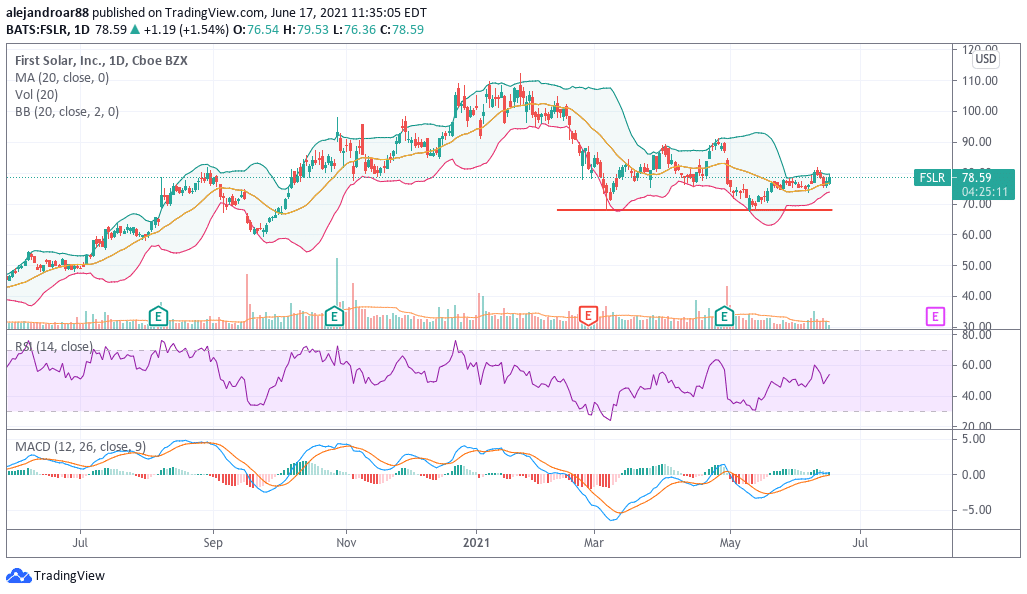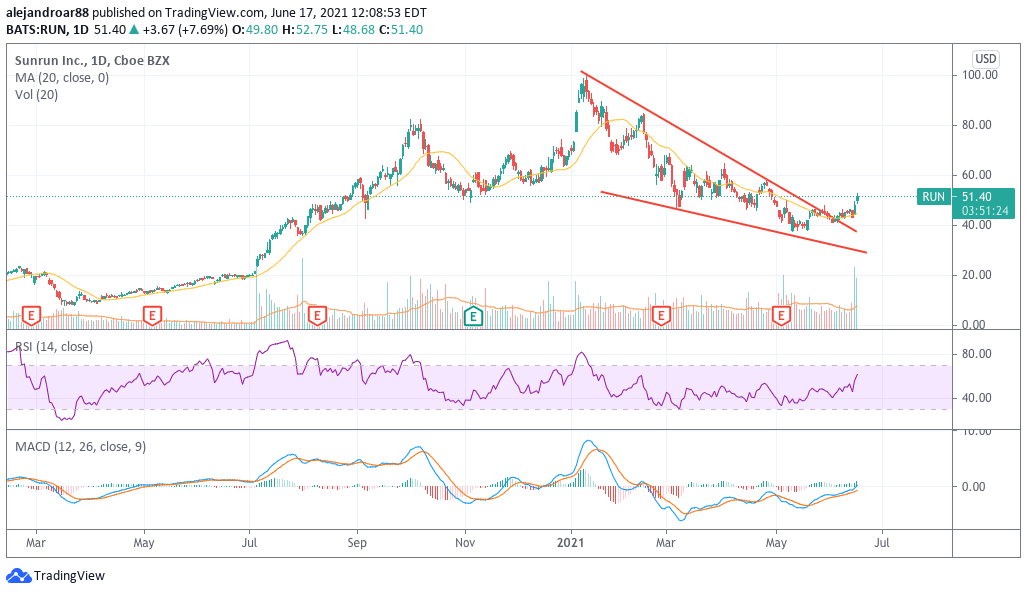5 Best Solar Stocks to Invest in for June 2021
Please note that we are not authorised to provide any investment advice. The content on this page is for information purposes only.
Last year was an incredible one for renewable energy stocks as world leaders stepped up to shorten the date of their net-zero carbon emission targets, which resulted in strong interest toward companies that specialize in alternative energy sources.
Among this group, solar energy stocks had a great run in 2020. However, the tables have turned this year as a result of an ongoing sector rotation toward certain battered sectors of the economy, with Invesco’s diversified Solar ETF (TAN) showing the extent of this underperformance as the fund is down 19.5% so far this year.
That said, if you are a strong believer that solar stocks are poised to stage a comeback in the short run amid the world’s increased interest toward reducing carbon emissions, the following article will take a closer look at four promising stocks within this sector while mentioning two more diversified alternatives you may want to consider.
1. First Solar (FSLR)

Overview: First Solar is an Arizona-based company that specializes in providing solar energy solutions to homeowners and companies in the United States and overseas, currently employing over 5,000 people while displaying a market capitalization of $8.2 billion.
Revenue growth: First Solar revenues have been declining since 2015, as the company has seen its top-line come down from a peak of $4.1 billion back then to $2.7 billion as of last year, possibly resulting from increased competition in the sector. Meanwhile, analysts expect to see the firm’s revenues landing at around $2.9 billion this year for a mild 10% year-on-year advance.
Profitability: On the profitability front, First Solar reported $398 million in net earnings last year or $3.76 per share while analysts are expecting to see the firm’s EPS landing at $4.06 by the end of this year.
Solvency: First Solar is a conservatively financed company that has only $400 million or so in long-term commitments on assets of $7.1 billion.
Valuation: Excluding the firm’s current cash and equivalents of $1.5 billion, First Solar’s market cap currently stands at $6.7 billion which results in a forward P/E ratio of 15.4 based on analysts profitability estimates for this year – quite a conservative multiple for what seems to be a promising player in this growing sector.
67% of all retail investor accounts lose money when trading CFDs with this provider.
2. SolarEdge Technologies (SEDG)
Overview: SolarEdge Technologies is an Israeli firm that is currently domiciled in the United States. The company employs around 3,100 people for its operations, providing a wide range of solar energy solutions including the sale of inverters and installation of photovoltaic units for commercial, residential, and industrial clients.
Revenue growth: SolarEdge revenues have multiplied by almost 11 times since 2014, moving from $133 million back then to $1.46 billion as of last year as a result of higher demand for the company’s products and services.
Profitability: Bottom-line profitability has been evolving positively for the company, moving from a $21 million loss in 2014 to $140 million in earnings as of last year or $2.79 per share at a 37.2% CAGR.
Solvency: The company’s long-term debt stood at $660 million by the end of the first quarter of 2021 while the firm reported $870 million in cash and equivalents and total assets of $2.47 billion.
Valuation: With a market capitalization of $12.9 billion, SolarEdge is being valued at almost 45 times its forecasted earnings per share for this year. This valuation seems somehow fair for SolarEdge as the firm has displayed a solid earnings growth rate that results in a price-to-earnings-to-growth ratio of 1.2.
67% of all retail investor accounts lose money when trading CFDs with this provider.
3. Enphase Energy (ENPH)
Overview: Enphase Energy specializes in residential solar energy solutions as the firm manufactures and sells photovoltaic units that can be easily installed by homeowners to power their properties. The company is based in Fremont, California, and currently employs around 850 people.
Revenue growth: Enphase has multiplied its annual revenues by more than 3 times since 2013, with sales moving from $233 million to $774 million as of last year.
Profitability: The profitability situation of Enphase has been improving substantially in the past two years as the company reported net earnings of $134 million last year and $161 million the year before vs. a $12 million loss it had reported back in 2018.
Solvency: Enphase had $900 million in long-term commitments by the end of the first quarter of 2021 on assets of around $2.2 billion, which included $1.5 billion in cash. Although this long-term debt seems big, it is comprised of only one 0% convertible issue. The implied conversion price of the notes is $307.5 per share and the exercising of the notes once and if the price reaches those levels will have a dilutive effect for shareholders.
Valuation: At its current market capitalization of $20 billion, Enphase displays a forward price-to-sales ratio of 9 and a forward P/E ratio of 83 times based on the firm’s forecasted earnings per share of $1.92 for 2021. These multiples seem quite stretched at the moment unless the company manages to accelerate the rate at which it is growing its earnings in the following years – something that analysts appear to be expecting.
67% of all retail investor accounts lose money when trading CFDs with this provider.
4. Sunrun Inc (RUN)

Overview: Sunrun Inc. is a Califonia-based provider of residential solar energy solutions that employs over 8,500 people and has a market capitalization of $9.33 billion.
Revenue growth: Sunrun has managed to grow its revenues more than 4 times since 2014, with top-line results moving from $199 million in 2014 to $922 million by the end of last year at a 29.1% CAGR.
Profitability: Sunrun’s profits have not been growing as much as one would like while the company reported a $173 million loss last year amid increasingly higher operating and financial expenses. Before that, the firm’s net earnings had been declining from a peak of $125 million in 2017 to as little as $26 million in 2019 on sales of $829 million.
Solvency: Solvency is perhaps one concerning factor for Sunrun as the firm has been progressively ramping up its long-term commitments until reaching as much as $5.6 billion by the end of the first quarter of 2021, possibly to finance the acquisition of Vivint Solar, which was announced last year. Assets for the company totaled $14.89 billion with $4.3 billion coming from goodwill items.
Valuation: With a market cap of $9.5 billion, Sunrun is being valued at almost 10 times its 2020 sales while profitability and solvency concerns seem too important to ignore and possibly make this valuation one that is hard to justify on the grounds of fundamental analysis.
67% of all retail investor accounts lose money when trading CFDs with this provider.
Other solar stocks to consider
Aside from the four companies mentioned in this list, investors could also consider Brookfield Renewable (BEP), a firm that specializes in providing renewable energy solutions from multiple sources including solar and wind. This firm has a market cap of $18.9 billion and produced sales of almost $4 billion last year.
Meanwhile, for those who prefer a more conservative approach when investing in this promising sector, Invesco’s Solar ETF (TAN) gives investors the possibility of buying a basket of more than 49 solar energy stocks including the ones mentioned in this article, while charging a fairly low annual expense ratio of 0.7%.
67% of all retail investor accounts lose money when trading CFDs with this provider.





